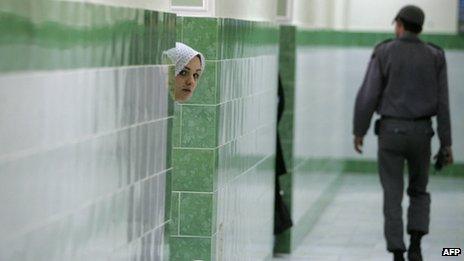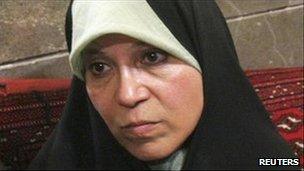Iran's Evin prison: Jail or 'hotel'?
- Published

On Monday, a group of Iranian MPs who visited the notorious Evin prison described Iran's biggest jail for political prisoners as a "hotel".
"From now on, I will call it Hotel Evin, rather than Evin prison," one of them, Safar Naeimi, said after his six-hour tour of the complex in the capital, Tehran.
But in recent years, many prisoners of conscience, who were mostly arrested after the post-election protests of 2009, have complained about their conditions in Evin.
Last month, 20 prisoners wrote an open letter to the head of the prison in which they criticised him for allegedly not letting sick inmates receive proper treatment, claiming his alleged negligence had "political motives".
It seems the MPs' visit to the prison is an attempt to defuse such complaints.
Mohammadreza Mohseni-Sani, one of the four visiting MPs, said prisoners "had no complaints regarding security, health, nutrition and the facilities provided at the prison".
Mr Naeimi said the prison's hospital was of the highest quality, while the kitchen served good food and offered a diverse menu.
He said as well as meeting other political prisoners, he had met Faezeh Hashemi Rafsanjani, the jailed daughter of former President Akbar Hashemi Rafsanjani.
"She was one of the few prisoners who complained about the food in Evin," Mr Naeimi said.

Faezeh Hashemi Rafsanjani is a former member of parliament in Iran
Ms Rafsanjani is serving a six-month sentence in Evin for taking part in anti-government protests and spreading anti-state propaganda.
The outspoken daughter of the former president was put in solitary confinement last month and was barred from any visits for "disrupting prison order", because she had protested against the situation in the women's ward.
Safar Naeimi said "the quality of Evin's food is better than the food at my home", adding that "if Faezeh complains, it's because she has been spoiled by different types of food that ordinary people do not eat".
Mohammadreza Jalaeipour is a reformist political activist who spent five months in solitary confinement in Evin for running a campaign supporting the opposition leader Mir-Hossein Mousavi in the 2009 presidential election.
He has told the BBC that the main problem at Evin is not the facilities, but the way prisoners are punished by being put in solitary confinement, or by being deprived of leave, phone calls and family visits.
"In solitary confinement, the prisoner is struggling [to breathe] the stuffy air, with isolation from the outside world and the pressures of the interrogators. It's not a matter of food or hygiene. The pressures are more mental than physical," Mr Jalaeipour said.
He said Evin's hospital might seem to meet standards, but it is short of specialised staff to treat certain diseases.
'Health risk'
The wife of Abolfazl Ghadyani, one of the oldest political prisoners of Iran, has told BBC Persian that she was afraid for her husband's life.
Zahra Rahimi said Mr Ghadyani almost had a heart attack in Evin last year, and that he was given the wrong medicine which caused him more health problems.
She mentioned the case of Hoda Saber, an Iranian journalist and veteran activist, who died of a heart attack in Evin after going on a hunger strike seven months ago.
"It was because the doctors didn't do enough to save him," she said.
She is afraid that the same thing might happen to her husband or other prisoners with heart conditions.
Abolfazl Ghadyani was sentenced to six years in prison for insulting the Supreme Leader, Ayatollah Ali Khamenei, and President Mahmoud Ahmadinejad.
He was transferred to Ghezel Hesar prison outside Tehran a few days ago for continuing to write critical letters to the authorities from inside the prison.
"He is now in the same ward as drug addicts, traffickers and murderers," his wife says.
More than 100 complaint letters have found their way out of Evin prison in the last few years, but its prisoners can still be punished by being sent to other prisons in Iran.
- Published4 December 2012
- Published23 November 2012
- Published21 October 2012
- Published12 June 2011